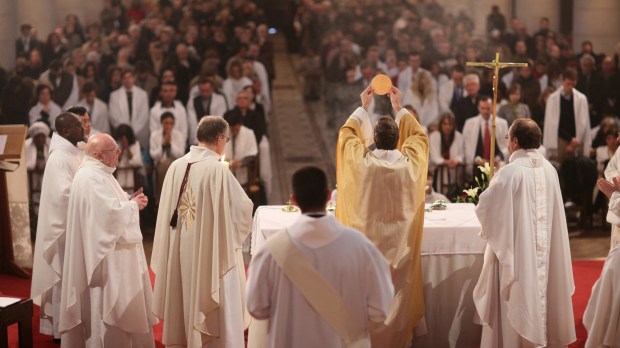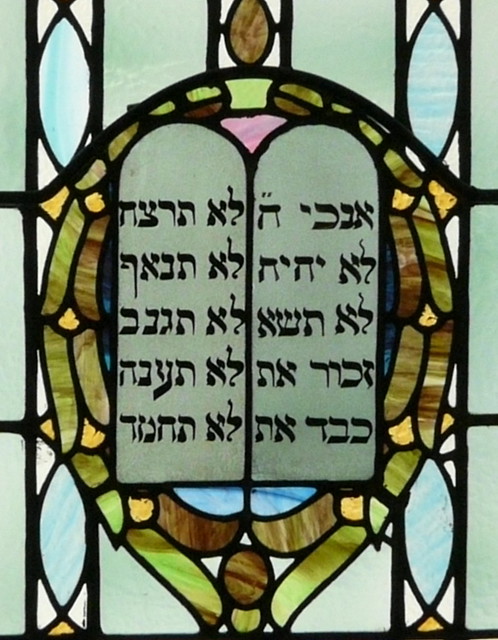The Texas State Senate has just passed a bill (Senate Bill 1515), now before its House, requiring that the Ten Commandments be posted in every public school classroom in the state. The author of the bill, freshman Senator Phil King (R-Weatherford), said that “the Ten Commandments are part of American heritage and it’s time to bring them back into the classroom.”
“[The bill] will remind students all across Texas of the importance of the fundamental foundation of America.”
According to the language of the bill, the Ten Commandments, taken (with, as is observed below, some significant exceptions) from Exodus 20:1-17 in the King James Version, are to appear on a poster, at least 16 by 20 inches, readable by “a person with average vision from anywhere in the classroom.” The poster, the bill states, “must read as follows:”
“The Ten Commandments
I AM the LORD thy God.
Thou shalt have no other gods before me.
Thou shalt not make to thyself any graven images.
Thou shalt not take the Name of the Lord thy God in vain.
Remember the Sabbath day, to keep it holy.
Honor thy father and thy mother, that thy days may be long upon the land which the Lord thy God giveth thee.
Thou shalt not kill.
Thou shalt not commit adultery.
Thou shalt not steal.
Thou shalt not bear false witness against thy neighbor.
Thou shalt not covet thy neighbor’s house.
Thou shalt not covet thy neighbor’s wife, nor his manservant, nor his maidservant, nor his cattle, nor anything that is thy neighbor’s.”
Evidently, the bill and its sponsors envision something like the old commandment boards from the original Anglican Church (built 1752-3) of Trinity-on-the-Green, New Haven, CT (photographed by John Wallace).
But the Ten Commandments are not as simple and straightforward as Sen. King and his colleagues evidently believe. Quite apart from the very legitimate concerns about the separation of church and state and the establishment of religion raised by Texas Senate Bill 1515, there are at least two practical problems with its implementation.
First, the Ten Commandments are recorded twice in our Bibles: not only in Exodus 20:1-17, the version whose wording appears in the bill, but also in Deuteronomy 5:1-21. Indeed, one reason that the fifth book in our Bibles is called “Deuteronomy” (“second law” in Greek) is that this second account of the commandments is found there.
While the two versions of the Decalogue are over broad swaths identical, there are important differences. The priestly Decalogue in Exodus 20 says,
“Remember [Hebrew zakor] the Sabbath day and treat it as holy. . . . Because the LORD made the heavens and the earth, the sea, and everything that is in them in six days, but rested on the seventh day” (Exod 20:8-11).

In this priestly version of the Decalogue, the Sabbath commandment not only alludes to the six days in the priestly account of creation (Gen 1:1–2:4a), but uses the same key words: “bless,” “sanctify,” “work” appear in both texts (compare Exod 20:11 and Gen 2:3). Still today in Jewish liturgy, Genesis 2:1-3 introduces the kiddush, the prayer over wine to sanctify the Sabbath, and is recited on Friday night, before the first Sabbath meal.God’s rest, together with God’s blessing and sanctification of that rest, is in priestly tradition the reason for remembering and sanctifying the seventh day–yet, according to the Texas bill, the reason for remembering the Sabbath is not to be on the classroom poster.

The Deuteronomic version reads,
Keep [Hebrew shamor] the Sabbath day and treat it as holy . . . Remember that you were a slave in Egypt, but the Lord your God brought you out of there with a strong hand and an outstretched arm. That’s why the Lord your God commands you to keep the Sabbath day (Deut 5:12-15).
Here, Sabbath is labor legislation, grounded not in theology but in Israel’s remembered history. Remembering what it was like to be forced to labor without rest, you are never to do the same to anyone ever again–not even to yourself!

Which version of the Ten Commandments we are reading makes a particular difference in the last commandment. In the priestly Decalogue (the one the Texas Senate wants posted on every classroom wall), Exodus 20:17 states,
Do not desire and try to take your neighbor’s house. Do not desire and try to take your neighbor’s wife, male or female servant, ox, donkey, or anything else that belongs to your neighbor.
Here, your (explicitly male) neighbor’s house–that is, all that he owns–is placed first, followed by a list of its contents. His wife, like his slaves, his domestic animals, and everything else included in his house “belongs to your neighbor,” and his ownership is to be respected: the same verb (khamad) is used both times in this verse (the KJV simply has “covet”). Other texts–most notably, the priestly account of creation to which the Sabbath command alludes (Gen 1:27)–challenge this idea, but in the priestly Decalogue, women are property.

However, Deuteronomy 5:21 reads:
Do not desire and try to take your neighbor’s wife.
Do not crave your neighbor’s house, field, male or female servant, ox, donkey, or anything else that belongs to your neighbor.
The change in the order here, the break in the middle of the verse, and the different verbs used with regard to the neighbor’s wife (Hebrew khamad) and the neighbor’s property (Hebrew ‘awah) are all accurately rendered features of the Hebrew text. The perspective is still masculine. But Deuteronomy puts the neighbor’s wife first, and makes a clear distinction between her and the neighbor’s house. In Deuteronomy 5, women are not property!
In short–the two versions of the Ten Commandments are not the same. We need the breadth, and the mutual correction, that reading both affords.
The second practical problem relates to the numbering of the commandments. On the poster mandated by SB 1515, the heading reads “The Ten Commandments,” but the commandments are not numbered–and there are twelve sentences. The Hebrew Bible refers to this passage three times (Exod 34:28; Deut 4:13; 10:4) as ‘asheret haddebarim (that is, “the ten words”). But depending on how–and where–we read, the commandments can be numbered in different ways, with different emphases.
The Texas Senate’s decision to use the traditional King James Version of Exodus 20 avoids concerns about the accurate translation of this text by ignoring them. However, as Cantor Sheri Allen, co-founder of the Jewish congregation Makom Shelanu in Fort Worth observes, differences in translation are not the only problem involved in privileging King James’ English over the Hebrew:
“I read and I chant the Ten Commandments in Hebrew — the original language — every year,” said Allen, who pointed out that Jewish traditions typically don’t number the edicts the same way as Christians.
This stained-glass window from the Plymouth Synagogue (built in 1762, it is the oldest synagogue in England; indeed in the English-speaking world) shows the ‘asheret haddebarim in the abbreviated form typically found in synagogues. The first commandment begins ‘Anoki Yhwh: “I am the LORD your God, who brought you out of the land of Egypt, out of the house of slavery” (Exod 20:2; Deut 5:6). That makes the second commandment the one that, as a young United Methodist, I learned to call the first: “You must have no other gods before me” (Exod 20:3; Deut 5:7)–in Hebrew, Lo’ yihyeh-leka ‘elohim ‘akherim ‘al-penay.
In Judaism, the “first commandment” doesn’t appear to be a commandment at all! Recall, though, that the Hebrew expression for this passage, ‘asheret haddebarim, actually means not “the Ten Commandments,” but “the ten words.” Similarly, “Decalogue,” a title often used for this text, literally means “ten words.”
In the first of these “words,” God introduces Godself, by name, as Israel’s deliverer–yet significantly, the mandated wording of the Texas poster does not include the words “which have brought thee out of the land of Egypt, out of the house of bondage.” In Hebrew, God’s name is YHWH. Pious Jews, out of respect for the Name (see Exod 20:7; Deut 5:11), do not attempt to pronounce it, but simply say “Adonai,” or “My Lord;” most English translations (including the KJV) accordingly render YHWH as LORD in all capital letters. In Judaism, God’s self-identification becomes very appropriately the first “word,” on which all of the words that follow depend.
 Not only do Christians and Jews read and number the commandments differently, but different traditions within Christianity do as well. Roman Catholic and Lutheran churches, following the version of the Decalogue in Deuteronomy 5, appropriately regard coveting a neighbor’s wife and coveting a neighbor’s property as two different commandments: the ninth and the tenth, respectively. They avoid having eleven commandments by, with Jewish tradition, reading the prohibition of idols (Exod 20:4-6; Deut 5:8-10, which I learned to count as the second commandment) as part of the command to have no other gods (commandment number one in my Sunday School class–but, remember, the second of the ten words in the synagogue).
Not only do Christians and Jews read and number the commandments differently, but different traditions within Christianity do as well. Roman Catholic and Lutheran churches, following the version of the Decalogue in Deuteronomy 5, appropriately regard coveting a neighbor’s wife and coveting a neighbor’s property as two different commandments: the ninth and the tenth, respectively. They avoid having eleven commandments by, with Jewish tradition, reading the prohibition of idols (Exod 20:4-6; Deut 5:8-10, which I learned to count as the second commandment) as part of the command to have no other gods (commandment number one in my Sunday School class–but, remember, the second of the ten words in the synagogue).
By specifying that it is Exodus 20:1-17 that is to be posted in every Texas classroom, numbered according to particular Christian traditions, this bill privileges, not merely Christianity, or even (as Cantor Green argues) Protestant Christianity, but a few specific Christian traditions. By requiring that the Commandments be posted in the King James Version, but with all references to Judaism removed, the bill further privileges extremely conservative groups within those traditions. As Andrew Seidel, Vice President of Strategic Communications for Americans United for Separation of Church and State told the Jewish Daily Forward, this is “very clearly an attempt to codify white Christian nationalism into the Texas law.” As such, this bill has nothing to do with the Bible, or with Christian faith, and everything to do discrimination.
